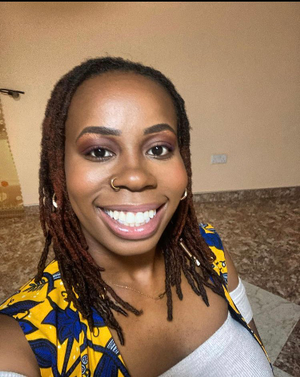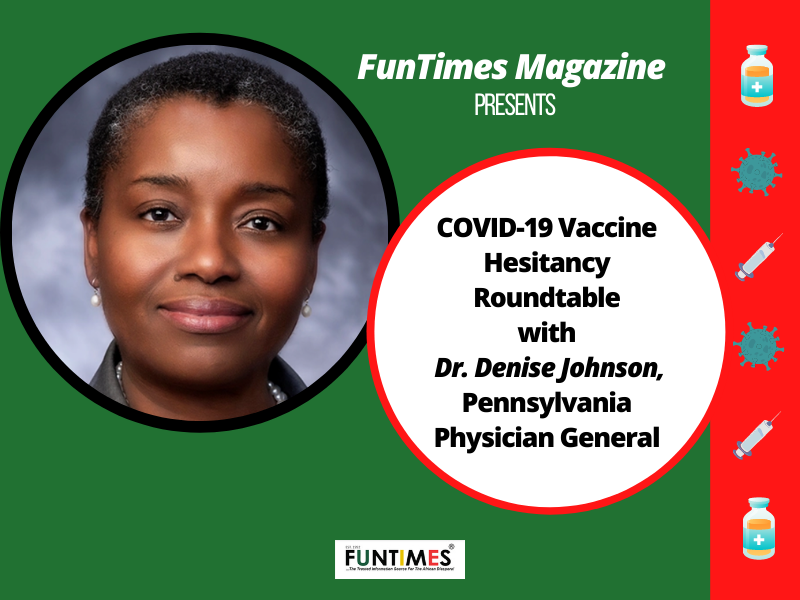On Thursday, October 28th, at 2:00 pm EST, FunTimes Magazine partnered with the Pennsylvania Department of Health and various media stakeholders to host the COVID Vaccine Hesitancy Roundtable, led by Dr. Denise A. Johnson.
Catherine Hicks from the Philadelphia Sunday Sun asked: “With the other illnesses like the flu, etc, should there be a waiting period with seasonal vaccinations and COVID boosters?
Dr. Johnson answered: “If you are eligible for the vaccine or booster, you need to get the vaccine right away. Without the vaccine, you can get a severe illness. The flu and COVID are both circulating. You can get the flu and COVID vaccine at the same time. You want to make sure you are protected against both. If you are not yet eligible for the booster, remember not to be worried if it’s not time for you to get a booster.”
P.O.C., the host and founder of From Revive Radio asked: “Do rising numbers of medicinal cannabis memberships have any correlation with COVID-19?”
Dr. Johnson says she is not aware of any survey in that population.
Karen Warrington from FunTimes Magazine asked: “In spite of the rollout, many people in the Black community feel they didn’t know where to access the vaccine. What is the correlation between PA and the availability of vaccines?
Dr. Johnson noted the work of Dr. Ala Stanford of the Black Doctors COVID-19 Consortium, and answered: “The department collaborated with local trusted messengers to offer faith-based clinics in places like churches and businesses because everyone doesn’t have the transportation to take time off work. We learned that we need to meet people where they are, know where our patients are, and know the limitations. Anyone can text their zip code to 438829, find the 3 closest vaccination locations to them, and get vaxxed. Most have more access now but that’s because of the lessons we learned during this pandemic.”
Loretta Rodgers from Chester News asked: “What can be done to make non-medical people feel safe taking the vaccine?”
Dr. Johnson answered: “We have given 450m doses in the US. Although we have seen some side effects, the serious side effects are quite rare. The incidence of the inflammation of heart muscles is much higher if people are not vaccinated.”
Ayana Jones from the Philadelphia Tribune asked Dr. Johnson to speak about pregnant women becoming vaccinated.
Dr. J answered: “I am a trained OBGYN. We know that with pregnancy, if you get COVID, the risk is much higher. The CDC said in August that 22 pregnant women have died because of COVID. Less than 1/3 of pregnant women have gotten vaccinated, and African American and Hispanic women’s numbers are in the teens. The vaccine does not affect future fertility. Many organizations strongly implore people who are pregnant or want to be pregnant to get the COVID vaccine.”
Karen Warrington from FunTimes Magazine asked: “Can speak to lessons learned about messaging towards people with auto-immune diseases i.e. obese people?”
Dr. J answered: “There have been sequential focus groups and surveys to see how the message works. People want to receive messages from people they trust, people who look like them and people who speak their language. People don’t always want to hear from the government. There has been a lot of work with organizations to make messaging more applicable. We have messaging in more than a dozen different languages. The CDC and HHS have done messaging as well. We learned people who are hesitant sometimes have valid questions and need to be listened to with empathy and openness. People don’t want to be shamed or pressured because of their vaccination status, so we have refined our messaging status.”
Thera Martin, Columnist/Journalist at The Scoop and Writer for the Philadelphia Sunday Sun asked: “Is it true that the virus can still be in you for 14 days, and you can enter society after that period?”
Dr. Johnson answered: “We found that after 14 days there may be some inactive virus that is shedding but it is unlikely that people will be infected from that. However, some still may have a positive test because the cells still may be shedding.”
Dr. Johnson adds that monoclonal antibody therapy is available for people with high-risk conditions and that the therapy can decrease hospitalization by 71%. It is an outpatient treatment and is not effective for people after 10 days of infection, or if people are sick enough to go to the hospital. She encourages people to talk with healthcare providers, and for vaccinated people to talk about their vaccination experience.
“You have the power to finish this”, says Dr. Johnson. Learn more about the vaccine here.
This article has been made possible by the Independence Public Media Foundation.


Nana Ama Addo is a writer, multimedia strategist, film director, and storytelling artist. She graduated with a BA in Africana Studies from the College of Wooster, and has studied at the University of Ghana and Kwame Nkrumah University of Science and Technology. Nana Ama tells stories of entrepreneurship and Ghana repatriation at her brand, Asiedua’s Imprint ( www.asieduasimprint.com ).





